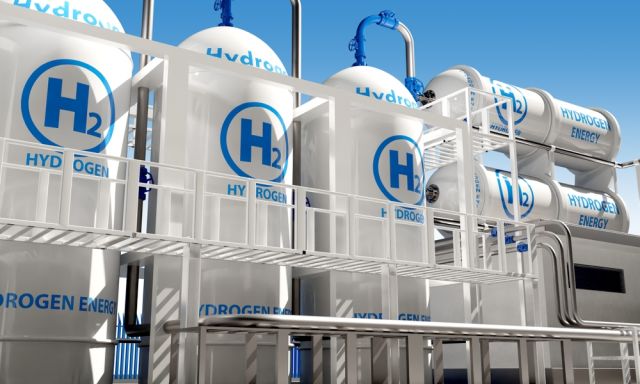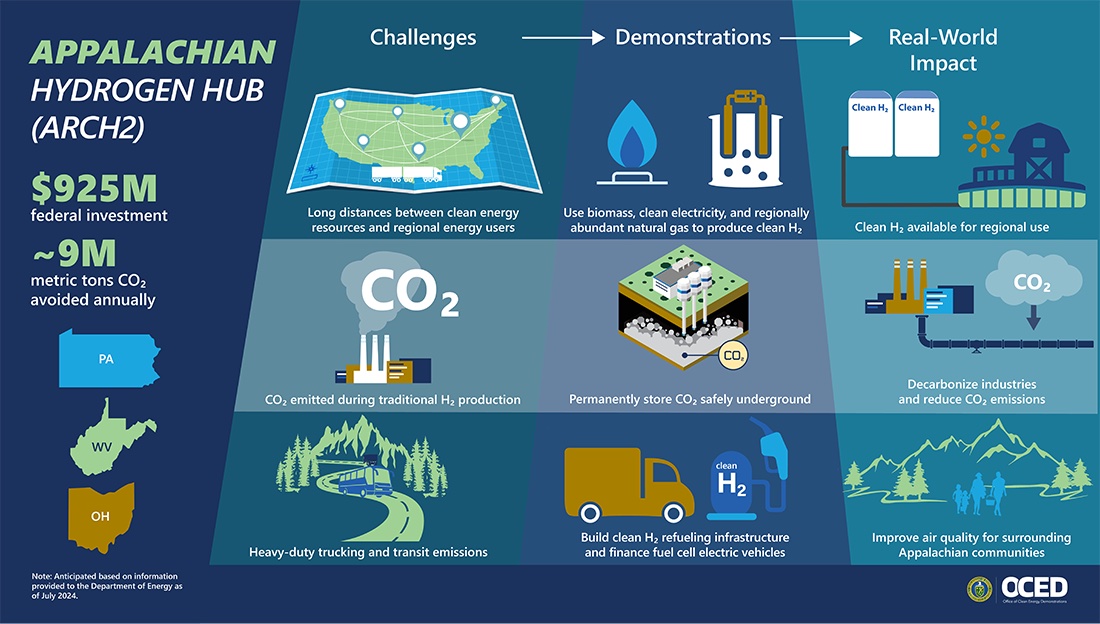
The nation aims to produce 10 million metric tonnes of hydrogen annually by 2030. (Source: Shutterstock)
The Appalachian Regional Clean Hydrogen Hub, led by Battelle with EQT Corp., CNX Resources Corp. and others as partners, has become the third hub to secure federal funding as the U.S. works to boost hydrogen production.
The U.S. Department of Energy (DOE) on July 31 said the hub, known as ARCH2, was awarded $30 million, the first tranche of the federal government’s up to $925 million cost share, to start the project’s first phase. ARCH2 activities include planning, analysis and design activities as well as ongoing stakeholder and community engagement in West Virginia, Ohio and Pennsylvania, where a network of projects will be developed.
The funding is part of up to $7 billion the U.S. has allocated to establish hydrogen hubs across the country. The hubs, which position hydrogen producers and consumers together with infrastructure, are part of an effort to boost a sector that could play a vital role in lowering greenhouse-gas emissions. The nation aims to produce 10 million metric tonnes of hydrogen annually by 2030.
Nearly one dozen projects associated with ARCH2 are in the works. Projects include Air Liquide’s plans to build and operate a hydrogen liquefaction facility, on-site storage and loading facilities, according to the DOE’s Office of Clean Energy Demonstrations (OCED).
Air Liquide’s project will be co-located with an EQT project.
EQT said it will construct and operate a clean hydrogen production facility to convert natural gas into syngas using autothermal reforming and the into low-carbon aviation fuel and other liquids.
“The advancement of ARCH2 enables EQT and our region to lead the next generation of natural gas by kickstarting a clean hydrogen economy that deploys innovative, commercial-scale technologies, promotes the growth of our economy and improves the environment by decarbonizing hard-to-abate industries that lack affordable, scalable solutions,” EQT CEO Toby Z. Rice said in a news release.

CNX Resources also plans to produce hydrogen using natural gas autothermal reforming. The hydrogen produced will be used to make ammonia for potential users in the agricultural and marine industries, according to OCED.
Natural gas and autothermal reforming are not the only feedstock and processes that companies plan to use at the hub. Enbridge Gas Ohio intends to produce hydrogen via electrolysis in the state to refuel hydrogen fuel cell buses and vehicles. Empire Diversified anticipates using food waste to produce hydrogen, with biogas generation and pyrolysis technology.
Altogether, “The hub intends to reduce CO2 emissions by 9 million metric tons per year—equivalent to the annual emissions of more than 2 million gasoline-powered cars,” OCED said.
Other hydrogen hubs that have moved into Phase 1, expected to last up to 36 months, include the:
Pacific Northwest Hydrogen Hub (PNWH2). The hub was awarded $27.5 million, the first tranche of up to $1 billion. Located in Washington, Oregon and Montana, the PNWH2 hub will use renewable resources to produce clean hydrogen via electrolysis.
The hub consists of eight project groups: five sites in Washington, two sites in Oregon and one site in Montana. Hydrogen produced will be used for agriculture, heavy-duty transportation, power generation, public transportation and refining. Partners include Air Liquide, Amazon, MHI Hydrogen Infrastructure and others.
Alliance for Renewable Clean Hydrogen Energy Systems (ARCHES). The hub was awarded $30 million, part of its up to $1.2 billion in federal cost sharing. It intends to use renewable energy to produce hydrogen at more than 10 sites. Projects include replacing diesel-powered cargo-handling equipment with hydrogen at the ports of Long Beach, Los Angeles and Oakland; building more than 60 hydrogen fueling stations for fuel cell electric heavy-duty trucks and transit busses; and transitioning key power plants to hydrogen among other projects. Air Liquide, Amazon, Brookfield Renewable US, Chevron, General Motors, Microsoft, Nikola, Plug Power are among the partners.
Recommended Reading
BlackRock CEO: US Headed for More Inflation in Short Term
2025-03-11 - AI is likely to cause a period of deflation, Larry Fink, founder and CEO of the investment giant BlackRock, said at CERAWeek.
Stonepeak Backs Longview for Electric Transmission Projects
2025-03-24 - Newly formed Longview Infrastructure will partner with Stonepeak as electric demand increases from data centers and U.S. electrification efforts.
Michael Hillebrand Appointed Chairman of IPAA
2025-01-28 - Oil and gas executive Michael Hillebrand has been appointed chairman of the Independent Petroleum Association of America’s board of directors for a two-year term.
What's Affecting Oil Prices This Week? (Feb. 3, 2025)
2025-02-03 - The Trump administration announced a 10% tariff on Canadian crude exports, but Stratas Advisors does not think the tariffs will have any material impact on Canadian oil production or exports to the U.S.
Trump Nominates E&P Advocate Sgamma to Head Bureau of Land Management
2025-02-12 - If confirmed by the Senate, Kathleen Sgamma, president of the Western Energy Alliance, would oversee management of approximately 245 million acres of surface lands.
Comments
Add new comment
This conversation is moderated according to Hart Energy community rules. Please read the rules before joining the discussion. If you’re experiencing any technical problems, please contact our customer care team.






